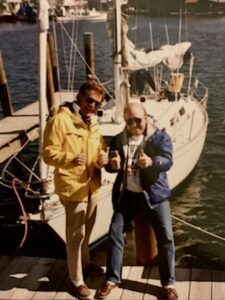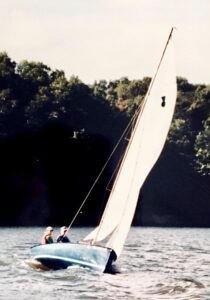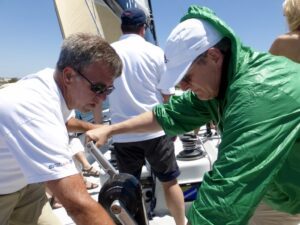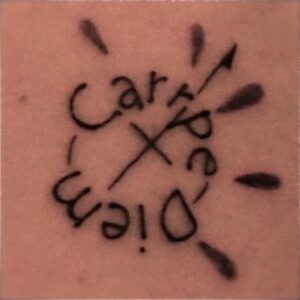What Sailing Taught Me!
A coaching client read my blog, Hell NO, I Don’t Want To Live Another 70 Years! They asked me about valuable lesson number nine: Learn to sail. Sailing has taught me more about life than any job, hobby, or sport. They asked me to explain what I had learned from sailing.
Sailing is a blend of ballet, sport, and art. “A sailor is an artist whose medium is the wind.” – Webb Chiles
I learned to sail at Woodland Trails Scout Reservation, the summer of 1969. I purchased the waterfront director’s Windmill sailboat at the end of summer camp. The Windmill was the first of four one-design sailboats I owned from 1969 – 2009.
I learned when you purchase and own something valuable, you take better care of it than something given to you. It’s important to care and inspect sails, lines, centerboard, rudder/tiller, tools, and trailer regularly. Replacing sails and other parts is expensive! If you take care of them, they will reciprocate and take care of you! The Windmill was a wooden boat and required attention to maintenance. I refinished the hull of that boat and learned to paint with care and precision! Doing the little things well makes a big difference.
Learn to take care of your body. Sailing one-design sailboats requires agility, flexibility, and strength. Stay in good physical shape. If you ignore your health, it will go away!

Sailing Chesapeake Bay 1986
Learn to be prepared. Check the weather! Don’t assume. Wear the correct clothing and non-slip shoes. Always wear a flotation device, no matter how good a swimmer you are! Have a change of clothing for after the sail. It isn’t fun to drive home in wet clothing after sailing.
When you are in a sailing regatta, you need purpose and direction to stay the course. Learn to use a compass and map and read the wind indicator. This applies to a well-lived life. Check the water for possible wind changes. Watch other boats and their wind indicators, and learn what they are doing to reach the next mark or finish line.
Learn to understand who has the right of way. Safety is always the priority on the water as well as life. Navigating a boat is different from driving a car. Other boats can come at you from any direction. There are no divided lines, signs, or traffic signals on the water. There are red markers you keep on your right (red-right-return) and green you keep on your left. Like driving, save the alcohol for later.
Three of my one-design sailboats required two or more people to sail the boat. Learn teamwork, communications, collaboration, cooperation, and celebration. It’s the crew who wins the race, not the captain! Bodies need to shift to get the proper stability to help maximize speed. Lines and centerboards need to be constantly adjusted. Pay attention to commands from the captain, the leader. When you come about, everyone needs to hear the captain so they don’t get hit by the mainsail’s boom! The captain also needs to hear input from crew members on what they see and are experiencing. Celebrate the little things like coming about well and making quick adjustments. What gets celebrated gets repeated!
Sailing requires patience and adaptability. Very seldom are you able to sail straight to your desired mark. There are wind and current shifts. Dealing with change is constant. It’s not the strongest or most intelligent sailor who wins the race. The winning sailor is the one most adaptable to change.
You are not a real sailor until you capsize and turn turtle. Learn to deal with failure and mistakes. Learn to fail forward! Failing teaches lessons and gives valuable learning lessons. I’ve learned more from my failures and mistakes than my successes.
Learn to be a part of community. One of my favorite times of sailing was after the sail and derigging the boat. Other sailors would come over to help, ask questions, give advice, share stories and a beverage. There was a sense of community, bonding and belonging. We are meant to be in connection with others and not go out into life alone.
Are you ready to learn to sail?








